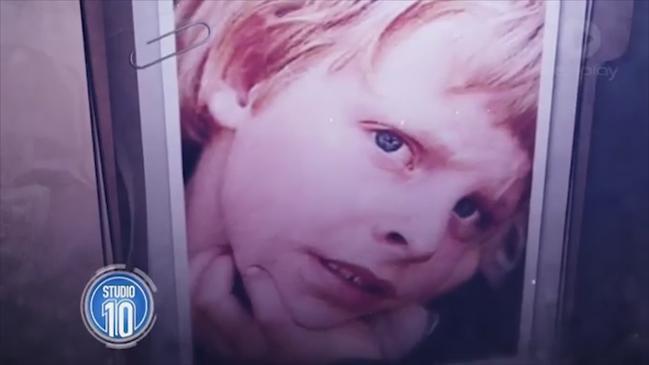Joe Hildebrand describes relationship with his brother, Paddy
JOE Hildebrand rarely talks about his brother Paddy, who went missing on a bushwalk and was never seen again. Today, he shared his story.

AUTHOR and journalist Joe Hildebrand’s brother went missing on a family bushwalk in 1987, days before Joe’s 11th birthday.
As Joe described in a rare interview on the subject with Studio 10 host Sarah Harris on Thursday, Paddy, 9, rounded a bend in Lilly Pilly Gully at Wilsons Promontory. He hasn’t been seen since.
One of the biggest searches in Victoria’s history would follow but there was no sign of him.
In his book, An Average Joe, Hildebrand describes the loving relationship he shared with his sibling and the memories he holds on to today. This is how he remembers him.
MY brother’s name was Patrick James Hildebrand and we all knew him as Paddy.
He was born a year and two months after me yet by my mother’s careful log of his development he was at each step more advanced than her adored eldest child, as outrageous as that might seem. He crawled, then walked, then talked, then read, all at an incredibly early age. It wasn’t until he was about three years old that my mother noticed the change.
At first it was just small things, as one might expect from a small person. A lack of comprehension at what was going on, sudden mood swings, unpredictable outbursts of violence. All qualities not uncommon to any three-year-old child but my mother, having charted his precocious course since birth, knew that something was wrong.
But it was the turn of the 1980s, which in Melbourne might as well have been the 1950s. As she was bounced around from GPs to specialists to psychiatrists, desperately trying to explain Paddy’s strange new behaviour, it became clearer and clearer that the doctors simply did not believe her. In a Kafkaesque demonstration of social insanity, the more convinced and insistent she became, the less they listened to her. Eventually, she later discovered, the file notes after one consultation suggested not that my brother be tested for mental incapacity but that my mother should be.
After years of fighting, my mother’s madness prevailed and my brother was eventually diagnosed with a condition dubbed Lennox — Gastaut syndrome. For want of a better medical diagnosis, let us consult the 21st century’s physician of choice, Dr Google. That font of all knowledge Wikipedia describes it thus:
Lennox — Gastaut syndrome (LGS) is a difficult-to-treat form of childhood-onset epilepsy that most often appears between the second and sixth year of life, and is characterised by frequent seizures and different seizure types; it is often accompanied by developmental delay and psychological and behavioural problems … Daily multiple seizures are typical … larger than that of any other epileptic syndrome … The seizures can cause sudden falling and/or loss of balance, which is why patients often wear a helmet to prevent head injury. In addition to daily multiple seizures of various types, children with LGS frequently have arrested/slowed psychomotor development and behaviour disorders.

In short, no one knows what the f**k it is. Nor what causes it, nor how it can be effectively treated. It is a monster in the shadows, a collection of symptoms in search of a disease.
As you might imagine, raising a child like this presented what modern parlance might term some ‘unique challenges’ and ‘atypical childhood experiences’.
One example is that for the first few years of our lives Paddy and I shared a bedroom, in which I — being the naturally ordained heir — of course had the top bunk. We would therefore while away the hours between bedtime and sleep with a simple yet invigorating game involving me dangling my legs over the edge of my bed and Paddy, thrashing about in the bunk below, seeing how often he could bite them.
We both considered this pastime perfectly normal and it must be said that whatever other developmental delays Paddy had, there was certainly nothing lacking within this particular skill set. Every night he would regularly succeed in locking his jaws around my big toe or a tender calf muscle — although getting him to release the relevant body part was something he was apparently less adept at.
And so the normal parameters of playtime were completely foreign to Paddy, not to mention those who ever encountered him. Readers of a certain age may recall the great backyard shrine of the totem tennis pole and the heavy plastic yellow bats used to whack its stringed ball in either direction. Suffice to say when the game was played with Paddy it was not just the ball that got belted into submission. In yet another testament to his ingenuity he also soon discovered that a more competitive advantage could be exacted by turning the bat sideways and swiftly applying its rock-hard edge to the other player’s bones.
On one occasion I foolishly let my guard down only to receive a cracking blow flush between the shoulder blades. I still remember the sound of the air whistling past the mighty weapon just before it landed on my spine, instantly distributing pain impulses to extremities of my body I scarcely knew existed. He was nothing if not a formidable opponent.
Even such incidents as these were a relatively easy escape. Slightly more enervating was when, after some forgotten provocation, Paddy cornered me around the side of the house with a sharpened axe. This, I realised, was a potentially serious situation. While I could usually best him at hand-to-hand combat, his innovative use of weaponry was, as we have seen, impressive to say the least. And while even the most impulsive child could usually be reasoned out of a potentially murderous course of action, it was difficult to talk Paddy down from the ledge when his blood was up.
After several impassioned pleas, threats and cries for help I came to accept that nothing was going to stop him from attempting to cleave me in two. And there was no means of escape. The side gate was locked behind me and any attempt to turn around and unlock it would surely be met with the same sensation between my shoulder blades I had already recently experienced via the totem tennis bat but this time with somewhat longer-lasting consequences.
And so I sighed, planted my feet on the spot and exhorted him to take his best shot.
Thankfully Paddy obliged, and reared the giant axe back over his shoulder with all his might so as to decapitate me in one fell swoop. In the tiny moment of truth when the axe lay primed behind him I was able to dart around and pull it down and away from both our young torsos. Thus disarmed, my brother moaned resignedly that I had ruined his fun and, after a few shakes of the axe on my part, scurried off to find another implement with which to dispose of me.
Extract from An Average Joe by Joe Hildebrand, published by Harper Collins. Available here at Booktopia and other online bookstores.




